Relution Server 5.8
Be secure with Relution
All-clear on the log4j/log4shell vulnerability: our system is not affected by the critical vulnerability in the log4j Java library. Relution uses support for Splunk (splunk-library-javalogging). The framework brings log4j-core in version <2.15.0. However, the affected framework is not used by Relution and thus the vulnerability cannot be exploited in Relution.
With Relution 5.8, the unused library log4j-core was completely removed.
Multilingualism in the Relution Portal
The Relution Portal is now available in the additional languages Spanish, Italian and French. This enables our international customers to have a more comfortable user experience in their local language.
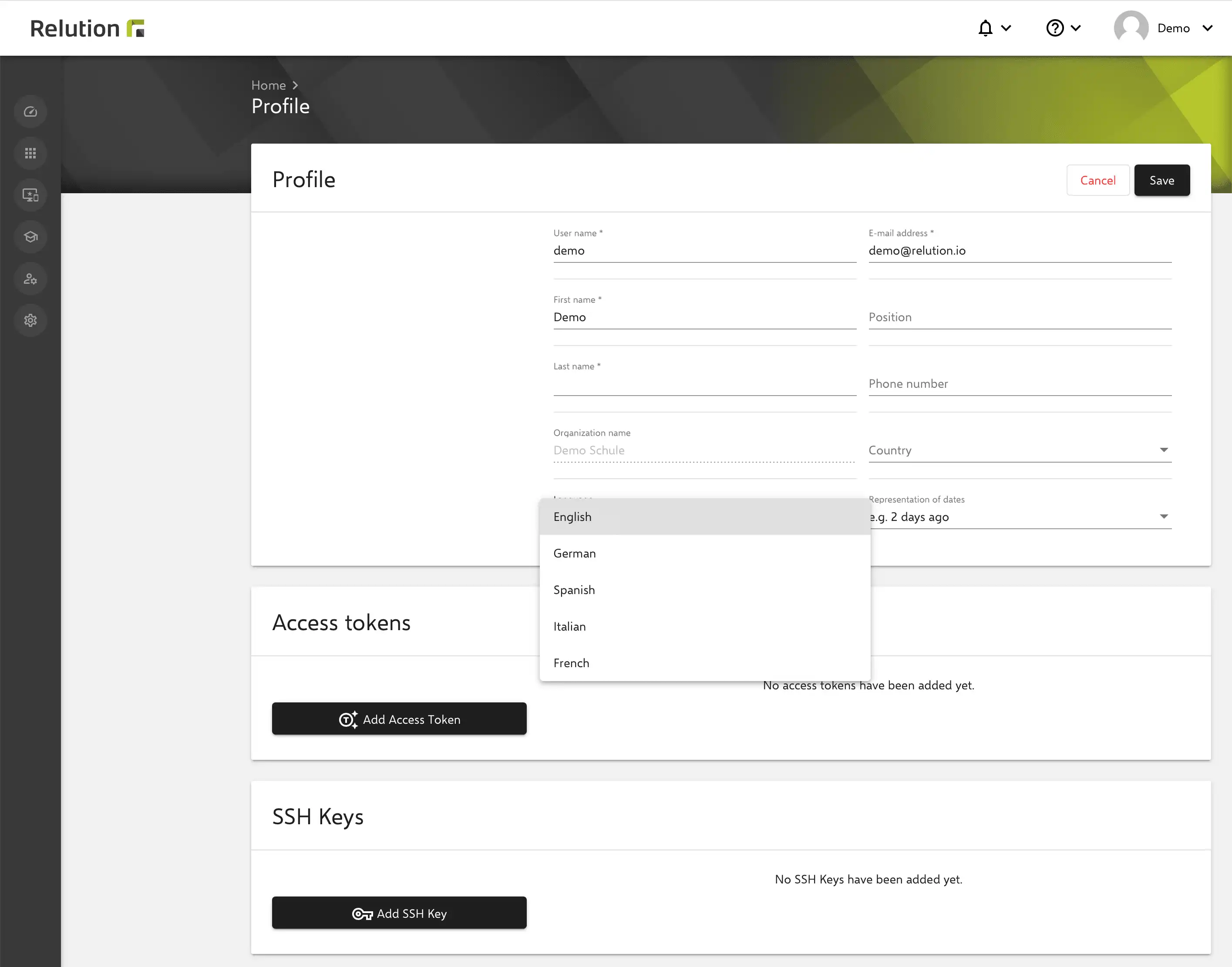
Adding apps to app categories
Apps can now also be conveniently added in the detail view of an existing app category. Adding individual apps via settings in the respective app details is also still possible.
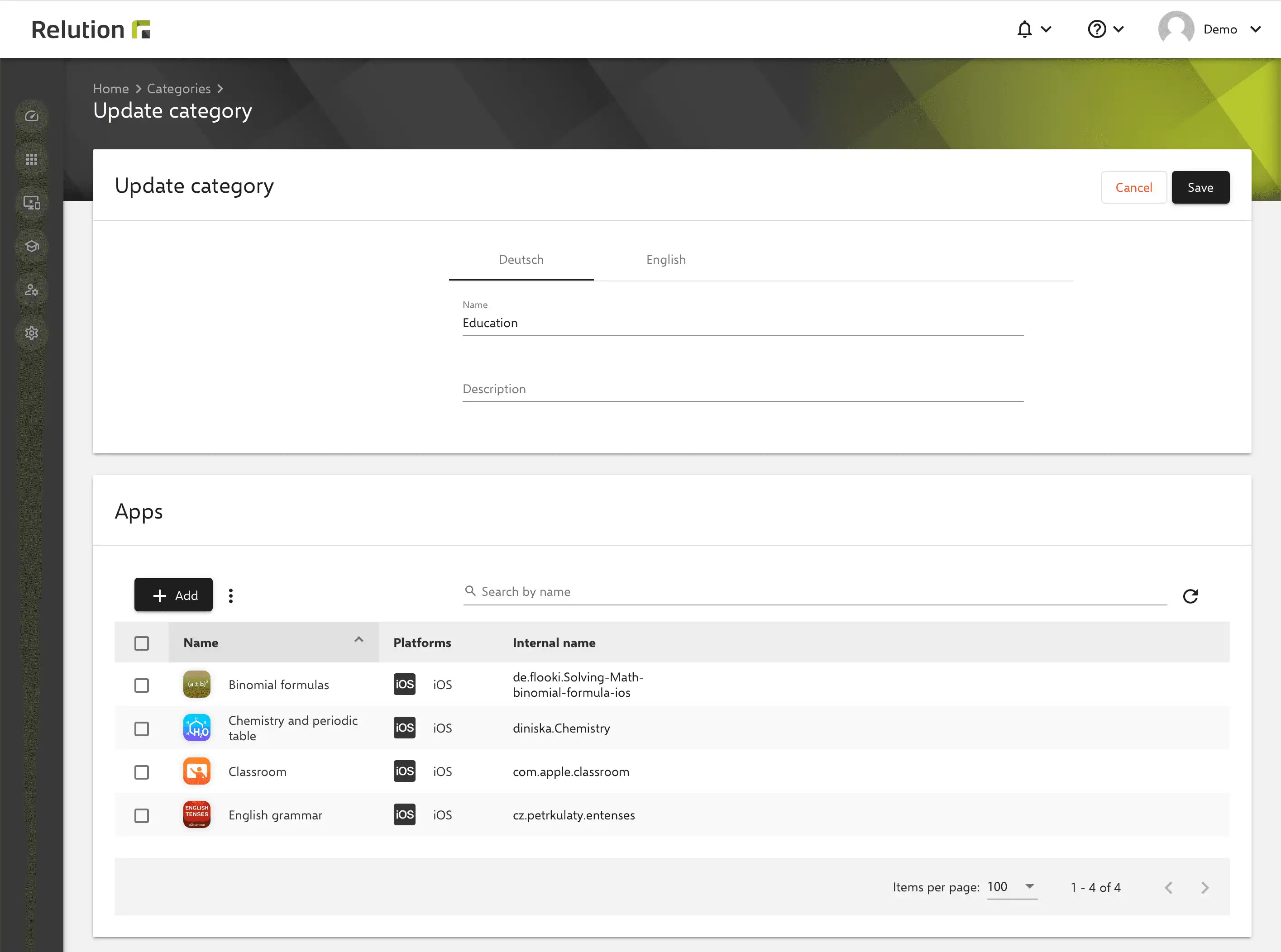
Display of multi-platform in the app inventory list
Apps from Apple that are usable for multiple platforms are displayed in the app inventory list with the corresponding platform icons.

Automatic assignment of VPP tokens to users during iOS user enrollment
Since Relution 5.7 it is possible to enroll iOS devices of private users (BYOD without DEP and not supervised) via iOS User Enrollment. With Relution 5.8 this feature is officially supported and is no longer a beta version.
In the context of iOS user enrollment, organization apps can be deployed to private devices by assigning VPP licenses to users rather than devices. VPP licenses are thus not tied to devices but to individual users. If a user uses multiple devices and has been assigned a VPP license, the corresponding app can be used on all devices. Assigned VPP licenses can also be withdrawn from users via Relution.
In order to assign VPP licenses of an organization to private users, the users must be linked to the VPP token of the respective Relution organization. For this purpose, a Managed Apple ID must be stored in the respective user profile for the corresponding users in Relution. The Managed Apple ID is created in the respective Apple School Manager or Apple Business Manager account of the organization for a user.
If an iOS user enrollment is created in Relution, it is mandatory to add a user with a pre-populated Managed Apple ID. If a private device is enrolled via the iOS user enrollment, the user with the pre-filled Managed Apple ID logs in and the device is enrolled in Relution.
If the user with the Managed Apple ID does not yet have a connection to a VPP token, Relution will automatically take care of the link and the user will appear under VPP users in the “Assigned” status. If multiple VPP tokens exist for the organization, the first VPP token in the order of stored VPP tokens under VPP user accounts in the Relution settings is always used. Subsequently, VPP licenses can be transferred to the VPP users in the “Assigned” status via Purchased apps in Relution in order to be able to install apps on the private devices via the VPP token of the organization.

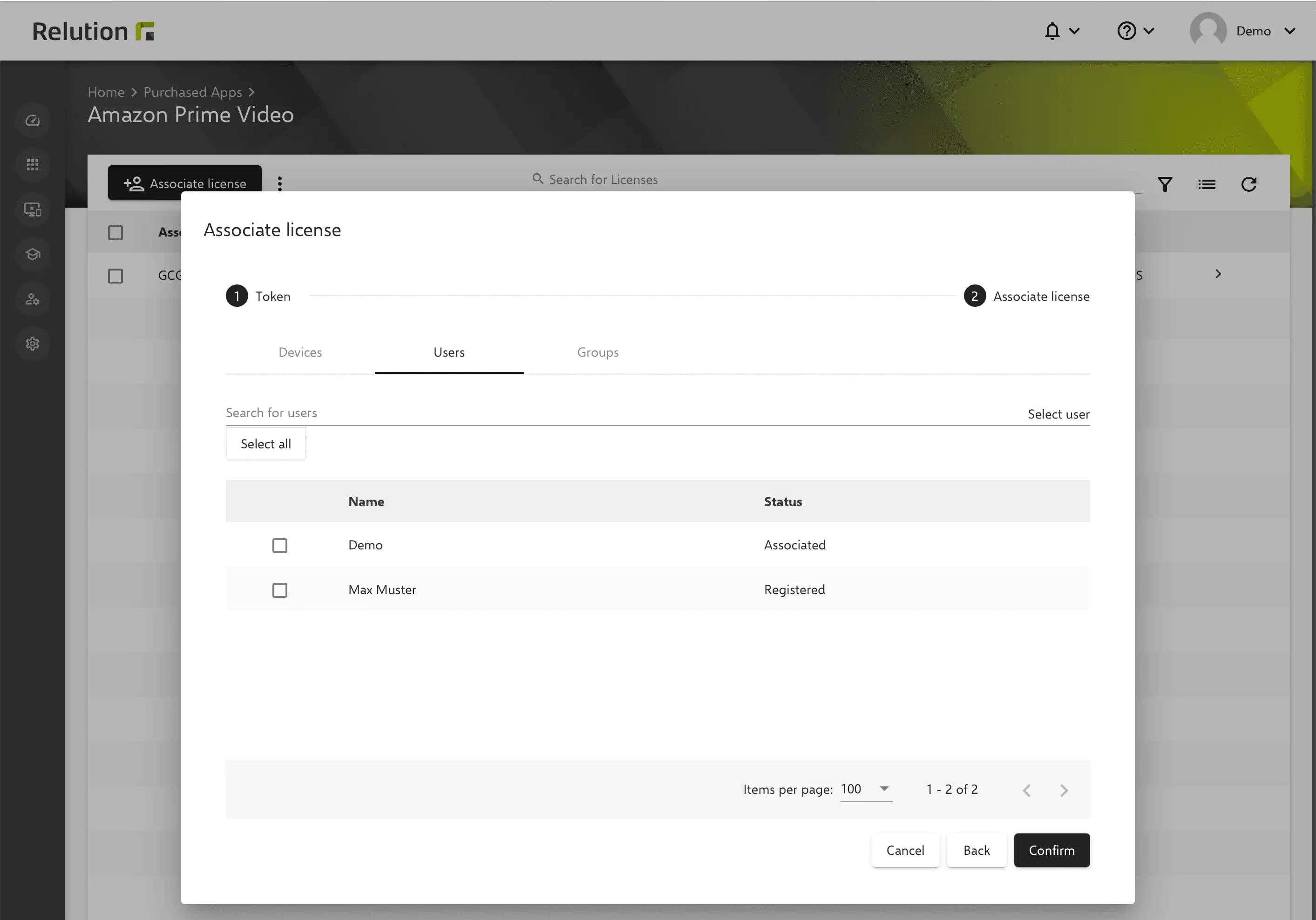

Users who do not have a Managed Apple ID stored in Relution can be invited to VPP users via a manual process. Learn more in the Insight Apple User Enrollment.
Per-App VPN configuration for iOS User Enrollment
Predefined VPN connections and per-app VPN configurations can also be applied to private devices via iOS user enrollment. When configuring the VPN connection, “For apps and accounts” and “VPN on demand” must be activated. Then, the app to VPN assignment is set up and the previously created VPN connection is linked to a desired app. After applying the published policy to the private device and installing the corresponding VPP license, the app is automatically connected via VPN.
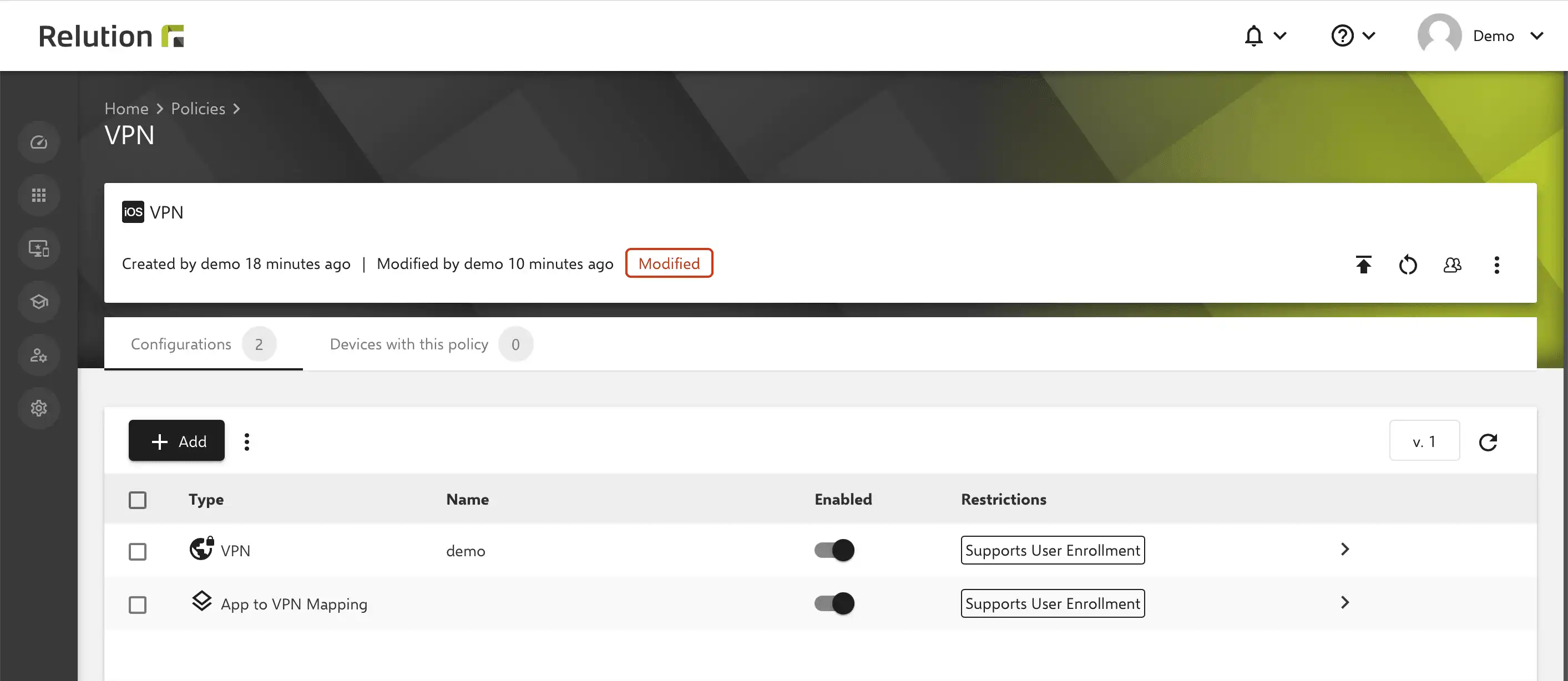
New status “Not now” for Apple devices
If an Apple device does not accept sent actions and reports back with “Not now”, a new status “Not now” is displayed for this action in the action overview in the Relution Portal. The status is also displayed for this device in the inventory list in a new column “Connection Status” as well as in the device details in the upper info box. As soon as the device responds with another message, the status will be updated accordingly in the Relution Portal.
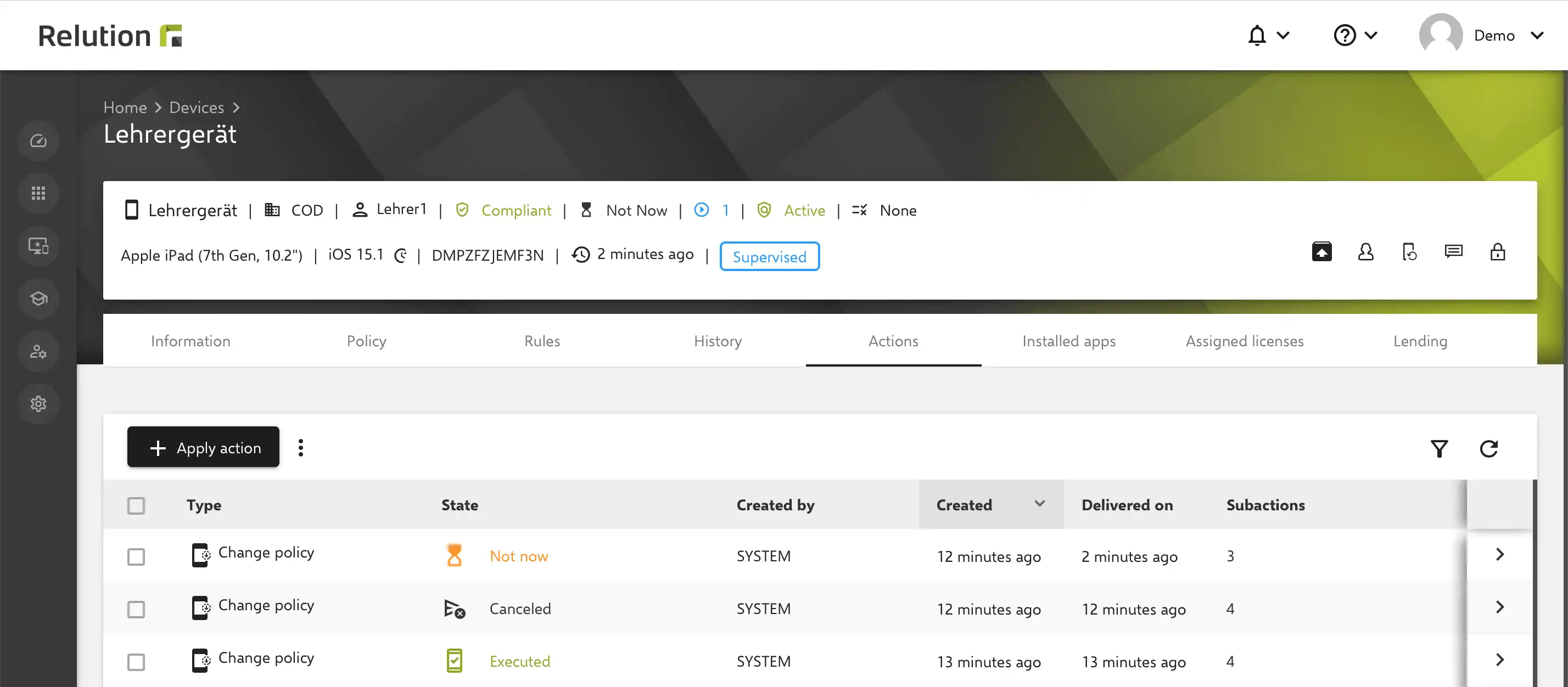
Global policies for Android Classic
The functionality of using global policies in Store Orga introduced with Relution 5.7 is now also available for Android Classic policies.
Apply apps, policies, and actions via device context
For enrolled Windows devices, it is possible to offer configurations and apps from Relution via different communication channels, the so-called device context or user context. For example, if apps are applied to a Windows device via the device context, the app is installed in the main file system of the device and can be used by all users. If, on the other hand, the app is applied via the user context, it is installed in the own files system of the enrolled user with whom the device enrollment in Relution was performed and can thus only be used by this user on the device. If apps are installed via the device context, they can be uninstalled via Relution, but they are still installed in the main file system on the Windows device and are only no longer visible to the user enrolled in Relution. For all other users on the device the app is still available.
In the device details, the last communication channel for Windows devices shows which context (device or user) was used.
Viewing network adapters for Windows devices
In the device details of Windows devices, existing network adapters are displayed in a fold-out section at the bottom of the information. Available information includes MAC address, IPv4 address, IPv6 address, type of network connection (wired/wireless), and connected (yes/no).

- New filter option App categories in the app inventory list and app request overview
- Expand iOS system app selection to include "Magnifier" and "Translate" in app conformance and homescreen layout.
- Display model names for Apple product names in the Device Details infobox.
- Preventing multiple additions of the same app from the Microsoft Store by using different country stores.
- Improved usability of email configuration for Windows devices.
- Allow changing the device ownership in the device details if this is allowed in the settings under Device management for enrollments.
- Add private apps from Google Managed Play Store disable for app store and app requests.
- Correct display of total and available VPP licenses in the configuration App Conformity when displaying added required apps.
- Bug fix when uploading CSV files in Auto Enrollment view with a multi-tenant user
- Policy import troubleshooting.
- Troubleshooting Compliance Violations for Windows Configurations.
- Bug fix for saving certificates in the WiFi configuration for tvOS.
- Bug fix for sending notification emails about the expiration of the keystore.
- Bug fix for redirect of link in email notification for app requests.
- Troubleshooting the use of the user's phone number for notifications during the creation of a new enrollment.
- Bug fix for displaying app icons from the Microsoft Store.
- Removing Windows 10 Home Edition in Windows Update Configuration.
- Removing the display of app downloads in the app inventory list and app detail pages, as well as the Most Downloaded Apps tile in the Dashboard overview.
- Performance optimization when retrieving installed and managed apps from Android Enterprise devices.
The changelog for the release can be found here.